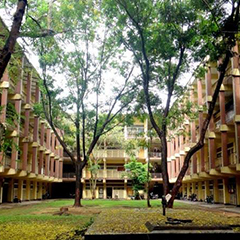NETWORKED MICROGRIDS ENSURE THAT RENEWABLE ENERGY IS AVAILABLE AREA-WIDE
Munich/Germany, Colombo/Sri Lanka, 22 October 2020: The off-grid experts at DHYBRID have taken a pioneering approach to the power grid in Sri Lanka. Their pilot project connects stand-alone grids to ensure a fail-safe supply of renewable power that can be utilized throughout the distribution area and expanded at any time. In the first stage of the project, DHYBRID is collaborating with its local partner DIMO to establish a grid-connected microgrid. The client is Sri Lanka’s leading utility company, Lanka Electricity Company (LECO), with power being supplied to the campus of the University of Moratuwa, Sri Lanka’s renowned technical university.
The hybrid microgrid relies on DHYBRID’s Universal Power Platform energy management system as well as the company’s battery energy storage system, which offers 400 kWh of capacity and an output of 400 kW. Power is generated by four roof-mounted solar systems with a combined output of 350 kWp. A diesel generator is reserved for exceptional circumstances.
Automatic compensation for fluctuations
DHYBRID’s hardware and software solution controls all local power generators, manages key electrical loads and avoids disruptions to the grid. Together with the storage system, it automatically compensates for fluctuations in renewable power generation, thereby increasing the autonomy of the local microgrid. Since a significant proportion of locally generated renewable energy is consumed on-site, only minimal amounts of electricity must be drawn from the national power grid. This approach also relieves strain on the public grid by using load management to ensure a more constant feed-in of surplus renewable energy.
Network of grid-connected microgrids provides security
In order to implement the microgrid concept across a broader area, additional grid-connected microgrids are planned. Connecting these microgrids to both the public grid and one another will create a supply system that maximizes local energy use while also preventing area-wide power failures.
The innovative concept of connected microgrids offers several advantages over a power system that lacks access to independent sub-grids: “For one thing, it is easier to coordinate consumers and producers of renewable energy in small-scale, local grids than in a centralized system,” explains Fabian Baretzky, regional manager at DHYBRID. “For another, if there is a power outage, the individual microgrids disconnect from the public grid to provide uninterrupted on-site power. This offers operators a high degree of stability and saves them money.”
If the public grid fails, the DHYBRID Universal Power Platform (UPP) automatically opens the mains breaker, which creates a local stand-alone grid managed by the UPP without interrupting the power supply. When the system detects that the public grid is available again, it measures the necessary parameters and resynchronizes the battery inverter, before seamlessly reconnecting the microgrid to the public grid.
About DHYBRID
DHYBRID is a specialized international solutions provider of renewable and hybrid energy systems for islands, industry and utilities with headquarters in Munich, Germany. The company offers turnkey solutions and individualized control systems for hybrid energy projects. DHYBRID combines conventional energy supplies such as diesel generators or utility grids with renewable energy systems and storage technology – perfectly controlled and comprehensively visualized.



























